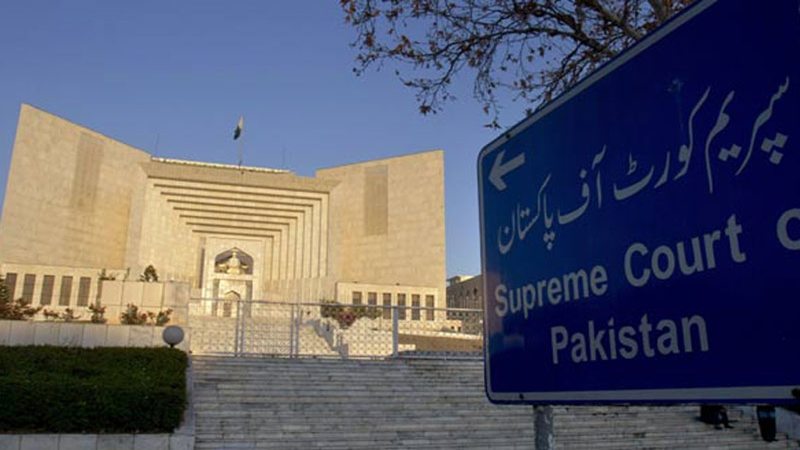 ISLAMABAD: In its detailed verdict issued on Tuesday on the review petition by ousted prime minister Nawaz Sharif against the Panama Papers case verdict, the Supreme Court has observed that former prime minister Nawaz Sharif tried to fool masses in and outside the parliament as well as the apex court.
ISLAMABAD: In its detailed verdict issued on Tuesday on the review petition by ousted prime minister Nawaz Sharif against the Panama Papers case verdict, the Supreme Court has observed that former prime minister Nawaz Sharif tried to fool masses in and outside the parliament as well as the apex court.
“Nawaz Sharif even tried to fool the court without realising that you can fool all the people for some of the time and some of the people all the time but you cannot fool all of the people all of the time,” the 23-page verdict issued by the court states.
The verdict dismissed the notion that there was no link between Captain (r) Safdar and the Avenfield apartments, as Maryam Safdar prima facie happens to be the beneficial owner of the property.
The court observed that no legal loophole has been identified in the Panama Papers case verdict which could be reviewed and that the accountability court was free to make a decision on the basis of the nature of evidence that comes before it. It said the trial court has the authority to reject any evidence, which it considers to be weak or unfounded.
The verdict said the facts about disqualification of Nawaz Sharif as prime minister were uncontroversial. It maintained that it could not be said that the decision surprised Nawaz Sharif. The court held that the evidence pertaining to Nawaz Sharif’s disqualification was undisputed.
“Petitioner (Nawaz Sharif) entitlement to salary stems from a written employment contract. Salary in this case, it may be noted, is not salary of the future which was yet to accrue. It was salary of the past six and a half years which had already accrued and accumulated. There is nothing in oral or written form, from July 2006 to January 2013 as could stop the accrual and accumulation of salary or prevent it from becoming an asset. There is also nothing in oral or written form in between July 2006 to January 2013 as could stop the withdrawal of the salary thus accrued and accumulated. Therefore, the argument that the salary even if agreed upon under the employment contract, would not be an asset if not withdrawn is not correct,” the order read.
“Refuge in evasive, equivocal and non-committal reply does not help always. If fortune has throned, crowned and sceptered him to rule the country, his conduct should be above board and impeccable. Whatever he does or says must be res ipsa loquitur (thing speaks for itself). Resignation rather than prevarication in ambiguous terms is more honourable exit if and when anything secretly carried under the sanctimonious gown of leadership drops and gets sighted. Since the prime minister of the country is thought to be the ethos personified of the nation he represents at national and international level, denying an asset established or defending a trust deed written in 2006 in a font becoming commercial in 2007 is below his dignity and decorum of the office he holds,” it added.
The Supreme Court on September 15 had issued a short-order rejecting the review petitions of the Sharif family and Finance Minister Ishaq Dar against its July 28, 2017, verdict in the Panama Papers case.
The detailed verdict says that the observations made in the Panama Papers case verdict were tentative. It said the verdict in the Panama Papers case will not have any effect on the references against the Sharif family for the accountability court and under the Evidence Act it will itself decide whether the testimonies were true.
The court, in its verdict, also addressed the appointment of a Supreme Court judge to monitor the trial before the accountability court, saying that the apex court has been practising this for quite some time and it is due to the casualness often demonstrated by different institutions.
During the hearing of Panama Papers case, the court had been observing that the behaviour of National Bank, FBR, NAB and other institutions was not adequate and that the apex court cannot turn a blind eye to these matters.
The apex court rejected the argument that appointing a monitoring judge was in violation of the Article 172 of the Constitution. “It cannot be imagined that the monitoring judge will influence the trial,” the court observed.
It has been noted that the directions to wrap up the trial in six months are not meant for influencing the trial court, but for early completion of the trial. Regarding an unexpected delay in the case, the court stated that in case of a delay during the trial, due to some hardships or for any other reason, the timeframe may be extended.
The verdict states that the observations made in the Panama Papers verdict were of temporary nature as the accountability court was free to make its own decisions based on the facts presented to it. Referring to a plea filed by one Mahmood Akhtar Naqvi seeking disqualification of a number of parliamentarians for hiding their dual nationality, the court had disqualified the parliamentarians under article 184 (3) of the Constitution, the detailed verdict recalled.
Published in Daily Times, November 8th 2017.